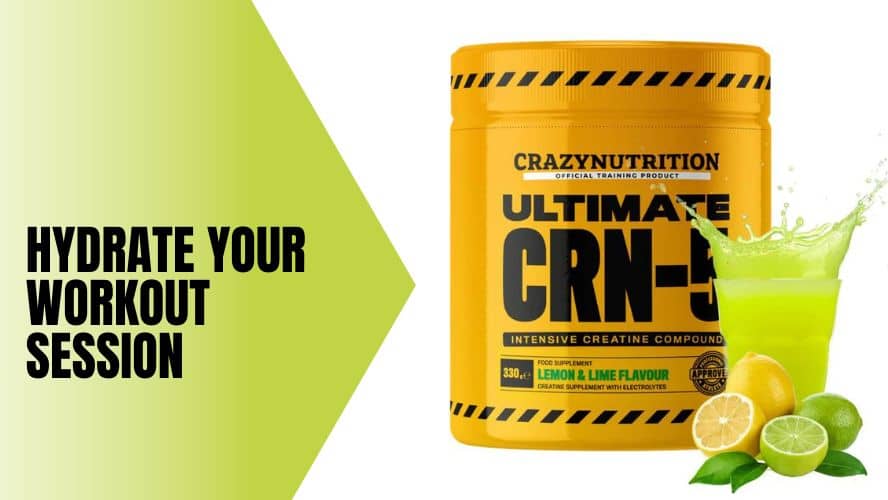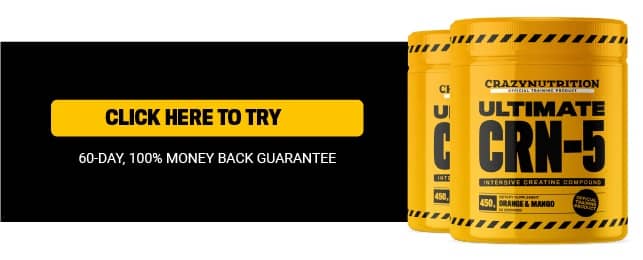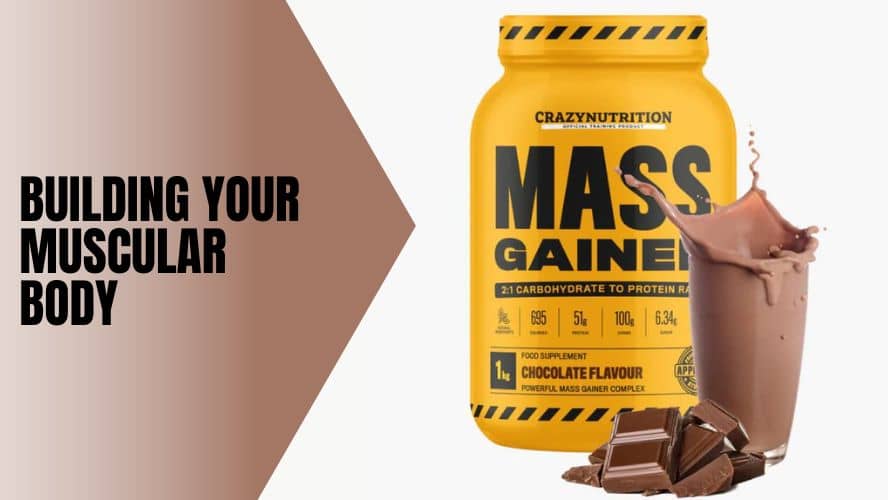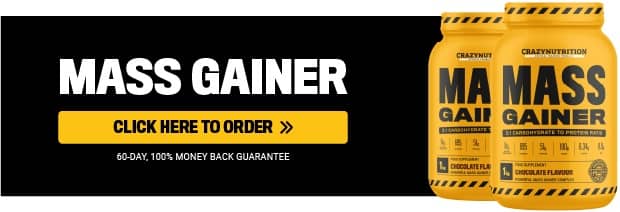- Have any questions?
- hello@bigandripped.com
The Difference Between Creatine and Whey Protein: Should You Take Both?
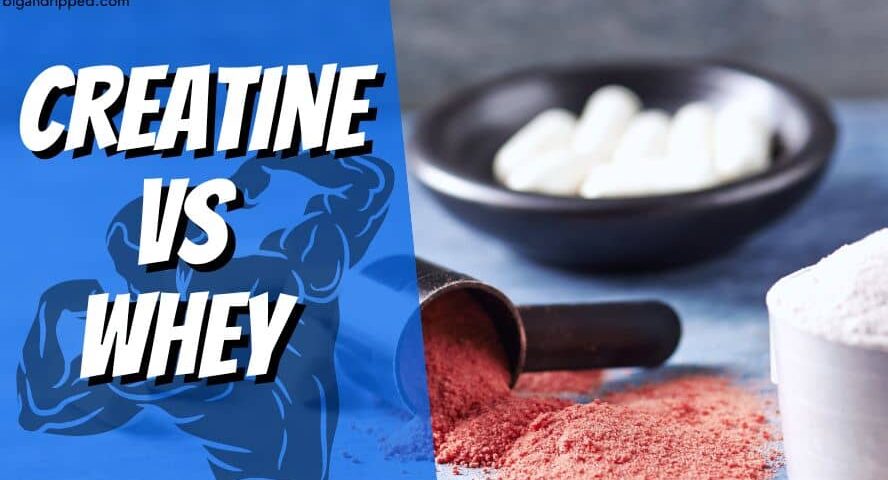
Creatine vs Whey -Which is Better for You?
Creatine and whey are the finest ways to stack up lean muscles, but what to prefer?
Creatine is popular among bodybuilders for muscle gain amplification. It delivers explosive power to improve workouts, speed up recovery, and intensify gains. On the other hand, whey is all about dairy-based protein. It also promotes active gains by employing energy boosts and stamina while training.
Both creatine and whey protein are widely available as workout-boosting supplements.
Adding these workout drinks replenishes your muscle mass while stimulating the repair and rebuilding process.
However, the toughest job is to select the right nutrition for your bodybuilding game. Of course, the right workout drink can make a huge impact on muscle-building results.
This blog aims to know every ins and outs of workout nutritional uptake with the naturally curated blend.
So, let’s begin our Creatine vs Whey discussion to know what’s more suitable for your fitness goals.
What Is Creatine?
Table of Contents

Creatine is a compound that naturally occurs in your muscle cells.
The main job of creatine is to generate ATP or adenosine triphosphate. ATP is responsible for cellular energy.
Of course, with more ATP, your body finds it easy to recover post-workout while performing intensely during your gym hours.
However, the human body can produce only 1 to 2 grams of creatine daily. Out of this, 95% of it is produced in skeletal muscles.
It absorbs water to make your muscles stronger. Indeed, more ATP and fluid retention from the compound can improve your physical well-being.
It improves muscle performance while taking your lift and endurance level to a whole new height.
Overall, the claims about creatine muscle-building effects are impressive. Still, let’s see what the research has to say.
Creatine for Muscle Gains: Studies and Effects
There are sufficient studies available on the compound to establish its actual benefits in terms of bulking.
This section on whey protein vs. creatine finds scientific facts about the compound.
Let’s discuss the details…
Study 1
A 4-week study of creatine supplementation along with complex training to observe muscle damage and athletic performance showcased impressive outcomes. The regime elevated maximal muscular strength and lessened body fat percentage. In short, the strategy may be effective in improving performance.
Study 2
A study investigated the impact of Creatine Supplementation on Muscle Growth. They found significant improvement in muscle mass, muscular strength, and athletic performance. The results were evident with varying dosages and training in young adults. However, studies need to investigate the same for older folks to conclude a point.
The study clearly mentions how creatine can be beneficial for the bulking cycle of young folks. Nonetheless, this workout drink has more to offer.
Creatine Benefits: Why Use It?
Creatine pre and post-workout supplementations are highly popular in the fitness community.
In general, it is applicable for performance-boosting effects along with elevated muscle mass and strength.
However, there is more to the best pre-workout drink.
Here are 6 science-based benefits of creatine
- Accelerate muscle cells to generate more energy
- Improves muscle function
- Supports HIIT and intense training
- Fires up muscle growth, repair, and rebuilding
- Helps in conditions like Parkinson’s disease, diabetes, and other neurological diseases
- May lessen your blood sugar level
Indeed, the benefits of creatine are helpful for bodybuilders and athletes.
So, its popularity in the fitness world doesn’t surprise us.
Considering the perks, deciding on either whey protein or creatine for beginners is tough.
There is another side to the performance-boosting formula, you need to explore the possible risks.
Creatine Side Effects: The Downsides
Creatine doesn’t have any long-term safety concerns. Still, before beginning creatine supplementation, consulting with your doctor is very important.
It is particularly applicable to liver and kidney problems. If you are underage i.e., below the age of 18, you should avoid the supplement.
Moreover, when buying creatine supplements, always prefer creatine monohydrate. Other formulas may contain unnecessary additives to prevent health risks.
Some do complain about creatine side effects including fluid retention, vomiting, diarrhea, cramping, dizziness, and even dehydration.
Observing side effects is necessary before making a final choice.
The discussion on creatine vs whey protein for fat loss explores the area. So, you need to be careful in terms of dosages to be on the safe side.
Recommended Creatine Dosage
Creatine supplementation can transform your bulking cycle. However, it depends on the creatine dosages you follow.
Thus, you need to pay attention to how you use it for maximum benefits.
- Take 20 g of creatine in the first week.
- Afterwards, increase the load, by adding 3-5 grams a day for a few weeks
The loading period is crucial as it makes your muscle ready to accumulate more creatine.
Once the loading period is complete, you can lessen your creatine dosages to a minimum level.
Also, changing your creatine dose is important to prevent your body from getting adapted to it.
When Should You Take Creatine?
Creatine works great as a pre-workout drink as well as a post-workout snack. So, it is your personal call, when toad it to your regime.
Creatine for muscle gains has performed greatly on a lot of its users.
Some prefer it for post-workout recovery to aid muscle growth and the repair process. In contrast, others consider it before a workout to utilize most ATP for an explosive workout to train muscles.
It’s better to consider the usage as per your current fitness goal. Further, creatine is not for everyone.
While it is great for most people, it must be avoided by certain people.
Who Is Creatine Recommended For?
Creatine is for everyone who wants
- Intense performance and extremely productive workout
- Heighten muscular power and strength
- Accelerate muscle building and repair
- For athletes, powerlifters, and bodybuilders who want to up their game
If you fall in the above category, adding creatine post-workout drink or pre-workout drink can be game-changing.
Indeed, it has some amazing nourishing and conditioning effects for your muscle mass, which can give you an edge.
Who Should Not Take Creatine?
Though creatine results for muscle growth are mind-whopping, it may not be beneficial in some cases.
The blog has mentioned the main downsides and side effects of creatine. However, some folks should specifically not use creatine supplementation. Avoid creatine if you:
- Have renal diseases, diabetes, or liver ailments
- Are suffering from some serious health issues
- Follow a prescription or recover from a disease or under a treatment
- Are under age
- Are pregnant or nursing
In the above cases, the use of creatine is prohibited. It is best to elevate your physique naturally ensuring safety.
Let’s discuss the safest way to load creatine…
Ultimate CRN-5: The Best Way to Load Creatine
(Available in Lemon & Lime and Orange and Mango Flavour)
Crazy Nutrition introduced ultimate CRN-5 as the finest way to add creatine to your regime.
The creatine drink explodes your strength to power max productive workouts. With intense reps and next-level endurance, your gym hours transform into a mega-bulking period.
The natural creatine supplement contains almost 5 types of creatine to elevate your power. On top of that, it encompasses additional electrolytes to elevate your energy levels, promote muscle growth, and regulate hydration.
This led to amazing Crazy Nutrition Ultimate CRN-5 Results.
With 5X the strength & stamina, the creatine formula transforms your bulking or strength cycle.
Crazy Nutrition Ultimate CRN-5 benefits
Some of the primary Crazy Nutrition Ultimate CRN-5 benefits are:
- Escalates your muscular strength
- Watch your reps reach peak
- Hydrates you during and after a workout
- Stores ATP for intense performance
- Supports post-workout requirement
- Aids muscle repair and muscle growth
The creatine supplement contains five types the ingredients to offer the mentioned advantages.
However, Creatine Monohydrate with 3,750 mg makes up the key constituent. Apart from that, Creatine Blend (45.4%) contains Di-Creatine Malate, Tri-Create Malate, and Tri-Creatine Pyruvate.
This part of the discussion focused on creatine for muscle growth.
Indeed, it has promising effectiveness, but it is better to take natural alternatives to ensure safety. Moving ahead in this creatine vs whey for weight loss dialogue, let’s discuss whey…
What Is Whey Protein?

Whey protein is an animal-based protein derived from milk and a by-product of cheese making.
Theoretically, the watery part of milk makes whey. It’s the remaining left after excluding another protein casein, which makes the cheese from milk.
Whey protein drinks are also among the most popular workout drinks. Available in multiple flavors, they are good for smoothies, shakes, and other fitness recipes.
Bodybuilders and athletes add them to their diet to escalate their sports performance while aiding muscle repair and rebuilding processes.
It is more popular because of its high protein content. It delivers the daily-required protein content for your bulking goals.
Thus, bodybuilders and athletes prefer whey protein supplements as pre and post-workout drinks.
It nourishes and conditions the existing muscle mass while promoting further muscle growth.
Whey Protein for Muscle Growth: Studies and Effects
Whey protein does have muscle-gaining effects considering its high protein content. Thus, many studies have investigated this area to establish its true efficacy.
Study 1
A study investigated the effects of the timing of whey protein supplementation. Participants took whey protein drinks before and after their resistance training. Indeed, there was a significant difference in their body composition, muscular strength, endurance, and hormone responses. Surprisingly, they found that the composition of protein and timing were more important than the amount of consumed whey protein.
Study 2
A review published on Whey protein supplementation and muscle mass established the current perspective. The study shows whey protein in the diet of resistance-trained participants is effective in intensifying muscle mass. On top of that, the observation found a positive impact in terms of muscle structure, strength, immunological, and hematological markers in participants.
The above study doesn’t only declare the efficacy of the whey protein for muscle growth.
However, it even stresses the importance of whey to take whey protein for bulking. We would discuss this further in whey vs creatine for muscle-building discussion.
Whey Protein Benefits: What’s More?
The high protein content of whey makes it desirable for different bodybuilding cycles.
Whether bulking, cutting, or strengthening, you require a significant amount of protein to support your goal.
Of course, the main perk is in terms of muscle growth. However, the workout drink can do much more than your imagination.
The benefits of whey protein are:
- Excessive muscle growth
- Aid muscle repair, rebuilding, and healing
- Conditions and nourishes existing muscle tissue
- Promotes body re-composition
- Eliminates body fat to promote weight loss
- Lessen cholesterol level
- Intensifies muscular strength and power
The benefits of whey protein perfectly fit the different muscle-building goals.
Some youths also ask queries like “Can I take whey protein for testosterone?” Well, the answer is actually mixed, because whey protein doesn’t directly boost the production of testosterone in men but works with other functions that can boost testosterone levels.
If you want a gigantic physique, a whey protein post-workout drink can provide an unimaginable difference.
Still, you need to read creatine vs protein for muscle gain reviews before making a final choice.
Apart from the advantages, the downside of whey is waiting.
Whey Protein Side Effects: The Shortcomings
When it comes to protein consumption, whey is the smartest and safest way to add more nutrients to your diet. On top of that, whey protein is easy to digest and ingest.
Still, not everyone would find it easy to take. People with liver or renal issues should avoid it in the first way.
Also, there is lactose in the workout drink, so lactose-sensitive folks should avoid it as well.
Though whey protein contains less than 1% of lactose, people highly sensitive to lactose can still face problems.
They may experience abdominal pain, constipation, and digestive discomfort.
Further, those who can easily add it to their diet must stick to the right dosage to avoid any adverse effects.
Recommended Whey Protein Dosage
Whey protein works mostly for muscle growth. It should provide surplus protein to elevate your game for the bulking cycle.
So, you need to appropriately follow your whey protein dosages.
Here’s how to take whey protein for bulking.
- Take almost 20 to 30g of whey protein daily. This ranges from about 1 to 2 scoops of protein powder.
Prepare whey protein in the form of protein shakes and smoothies. You can even take a whey protein supplement.
If you’re a vegan, whey supplements are the best option to boost your protein intake.
When Should You Take Whey Protein?
Knowing when to take it is important to make the most of the whey protein.
Whether after, during, or before a workout, taking it adequately can improve your gain.
- Having it as a pre-workout drink promotes muscle growth by boosting nitrogen balance.
- As a post-workout drink, whey protein elevates muscle repair and recovery process while supplying sufficient nutrients.
Whether you use whey protein post-workout drinks or pre-workout shakes, it is your personal call.
Of course, you should make the decision based on your current fitness goals.
Who Needs Whey Protein?
Whey protein is a high protein content drink.
Indeed, it can accelerate your muscle-building process while accelerating your bulking goals. Here’s who should use whey protein:
- People want to build muscle
- Filling in the nutritional gap
- For an intense bulking cycle
- Elevating muscular strength and power
- Losing weight
- For maintaining body weight composition
- People find it challenging to get enough protein from a diet
If you want to achieve the above-mentioned goals, whey protein can be a perfect partner for you. Indeed, adding the best post-workout drink for muscle growth can offer impressive differences.
Who Should Not Eat Whey Protein?
Though whey protein is beneficial for different bulking goals, it may not work for everyone.
Some may face health risks after using the drink. Here’s Who Should Not Use Whey Protein.
- Patients with renal diseases, diabetes, or liver ailments
- Patients with some serious health issues
- Under 18 folks
- Pregnant or nursing
- People under treatment
If you fall in the above category, avoid using whey protein for bulking.
Though it may seem like an authentic idea to stimulate muscle growth, it won’t do well. Instead, it may lead to problems, so avoid it.
Further, there is an easy way to get the benefits of this type of protein. You can add whey protein supplements to your diet.
Not only these supplements are curated in the right dosage but are also restrict the side effects none.
Here’s the current favorite whey protein supplement of bodybuilders.
Mass Gainer: For maximum power of Whey
(Available in chocolate and vanilla flavors.)
Whey protein can transform your bulking cycle.
Crazy Nutrition utilizes the power of the ingredient to boost up the intense muscle-building phases.
It uses whey protein along with many powerful natural muscle-boosting ingredients to offer explosive gains.
Crazy Nutrition’s MASS GAINER aims to elevate your size, stack lean muscle, and promote recovery.
Such crazy benefits without loading artificial filters like maltodextrin. In other words, your gains are natural and completely safe.
On top of that, it contains DigeZyme to aid digestion, Carb10® to prevent sugar spikes, and AstraGin® to boost absorption.
This leads to the astonishing results of Mass Gainer by Crazy Nutrition.
Crazy Nutrition Mass Gainer Benefits
Some of the primary Crazy Nutrition Mass Gainer benefits are:
- Increase your muscular size
- Jacks up lean muscle
- Intensifies your muscular size
- Elevates your energy stores
- Boosts your mood and energy
- Promotes post-workout recovery
Crazy Nutrition mass gainer is the finest way to aid the muscle growth process. You need to follow the dosages while adhering to other guidelines to get the best results.
The creatine vs Whey for muscle growth discussion isn’t over yet. Some questions related to the best workout drink for performance require answers.
Now while discussing creatine vs. whey protein, thinking about creatine’s existence in whey protein is obvious.
So, does whey protein contain creatine?
It depends on the particular blend, crazy Nutrition does contain a small quantity of creatine to strengthen your muscle.
Can You Take Whey and Creatine at the Same Time?
Taking whey and creatine at the same time is possible. It can add more dimension to your bulking process.
However, it entirely depends on what kind of fitness goals you focus on.
Various brands in the market craft the power of the two best natural workout drinks.
However, the key is to deliver the right quantity of nutrients that benefit your bulking goal.
For instance, if you have sufficient whey while inadequate creatine, it won’t do much.
Your protein intake should be around 1-2g of protein per kg of your body weight. It goes around 20g to 40g of protein.
On the other hand, the routine should include at least 3g of creatine. This is good to go head for explosive bulking and strength cycle.
With this, our discussion on whey vs creatine for muscle growth ends here. At the last, let’s wrap up the entire dialogue with important points.
Creatine vs Whey: The Final Verdict
The Internet is full of questions like ‘Which is better creatine vs whey protein’ or ‘Is creatine or whey better?’
The truth is, it is hard to say which is better than the other.
Creatine and whey both have the best natural post-workout and pre-workout effects. Adding them to your routine will lead to major differences.
Creatine is more able to improve your muscular strength, power, and performance. On the other hand, whey is more about the muscle-building process.
Bodybuilders, athletes, and fitness enthusiasts add nutrition according to their goals. The same recommendation is applicable to you.
Thus, when it comes to whey vs creatine, choosing the better option depends on your fitness goals and body type.
Both work in a different and complementary way to deliver muscle-gaining benefits.
The most important thing is your entire fitness regime. The diet, training program, supplementation, and nutrition, all have equal importance.
Whey and creatine will only support your existing efforts rather can bring magical change.


